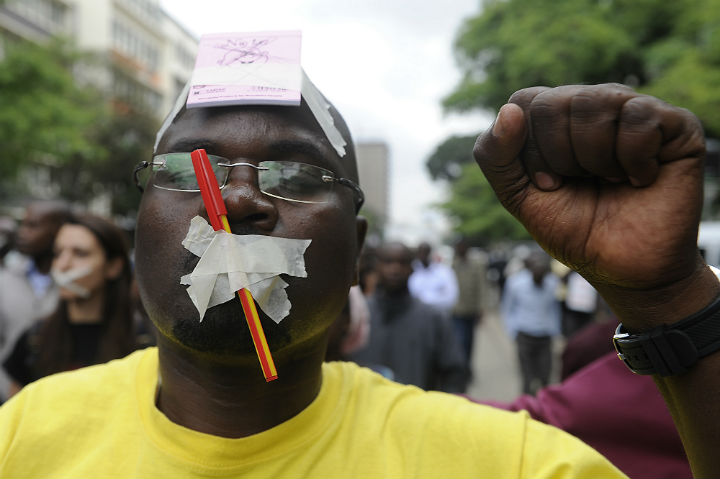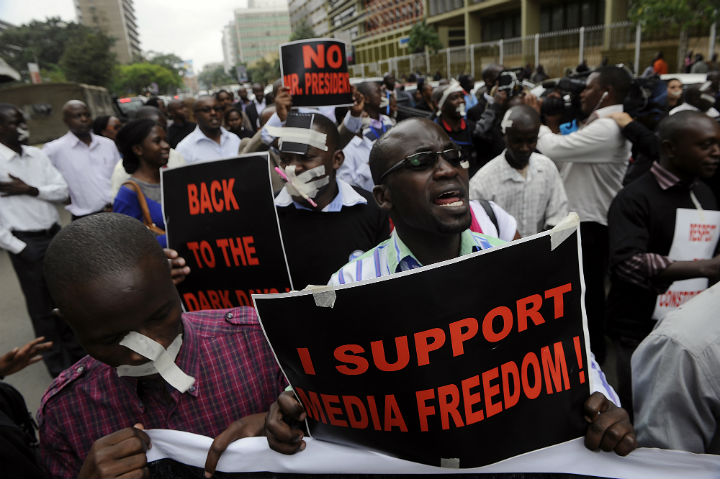Months after Kenyan media published reports criticizing the government’s response to the deadly terrorist attack at an upscale Nairobi mall, parliament has passed legislation seen as putting a gag on media.

The Kenya Information and Communications (Amendment) Bill 2013 has been called “ruthless” and “draconian” by media groups.
The passage came one week before Kenya marks the 50th anniversary of its independence from Britain, on Dec. 12, and on the same day Nelson Mandela passed away.
Opposition MPs reportedly walked out of the debate Thursday evening “after several failed attempts to postpone debate on the matter,” Kenya’s Daily Nation reported.
Once enacted, a “quasi-government” complaints commission will be set up to handle grievances made against journalists or media companies.
Media outlets could face fines between 1 million shillings ($12,320 CAD) and 20 million shillings ($264,000 CAD) if they fail to respect government-established standards and code of conduct.
Individual journalists could also be forced to pay a 500,000 shilling ($6,160 CAD) fine and possibly be banned from reporting.
Journalists say it essentially puts a gag on media and have vowed to appeal.
- Mohamed Al-Fayed, whose son died with Princess Diana, accused of multiple rapes
- 12-year-old shoots, kills black bear attacking his dad in Wisconsin
- Hezbollah chief says Israel crossed ‘red lines’ with exploding device attacks
- Yellowstone Park tourist burns leg after going off trail near Old Faithful
“Our position as Kenyan journalists remains the same: The laws are a grave affront on the freedom of media,” said Macharia Gaitho, chairmen of the Kenya Editor’s Guild. “They are well calculated to target journalists and media enterprises with the ultimate aim of gagging them through hefty fines and penalties.”

Get daily National news
According to Reporters Without Borders, which ranked Kenya 71st out of 179 countries on its 2013 Press Freedom Index, the Complaints Commission “would be able to ban newspapers if their content, including cartoons, was deemed to pose a threat to ‘national interest,’ ‘public order’ or ‘security’ without these threats being defined.”
“As journalists, this is a very sad and dark day for us. Freedom of media and freedom of expression has been effectively buried by the passage of this law. It is ironical that such repressive moves against the media are happening as Kenya celebrates 50 years of independence,” the guild’s vice-chairman David Ohito told The Standard.
The bill was put forward in July, two months before al-Shabab gunmen killed dozens of civilians at an upscale mall in Nairobi.
But in the wake of the Westgate Mall attack on Sept. 21 government criticism of national (and foreign) media has increased as media reported on the handling of the situation.
A month after the attack, Kenya’s police chief David Kimaiyo warned media not to “provoke propaganda” or “incite Kenyans,” and threatened to arrest reporters from the Standard Group’s Kenyan Television Network.
“We are looking within the law very closely for those individuals who in one way or another might have committed crimes,” Kimaiyo said in October.
The comments came after video emerged of some soldiers looting the supermarket following the attack.
“We should not be too quick to vilify our security forces because they work hard for the country’s safety sometimes even endangering their lives,” President Kenyatta said of the coverage.
Kenyatta vetoed the bill in November, sending it back to parliament after he made revisions including decreasing the proposed fines. But with it’s passing, the president has urged media not to exaggerate their interpretation of the bill.
“If you have no intention of committing crimes, then why are you afraid of the proposed fines,” the president said on Friday.
“Be honest and stop spreading falsehoods on the provisions in the media bill. Penalties imposed in other countries particularly the West are stiffer than those proposed in the media bill,” he said.
Kenyatta still has to sign the bill in order to give it ascent.
Kenyatta, the son of Kenya’s first president, is also embroiled in another controversy. He’s defiantly facing crimes against humanity charges at the International Criminal Court, accused of inciting ethnic violence in the lead up to the 2007 elections.









Comments